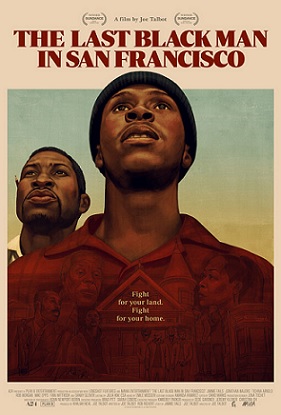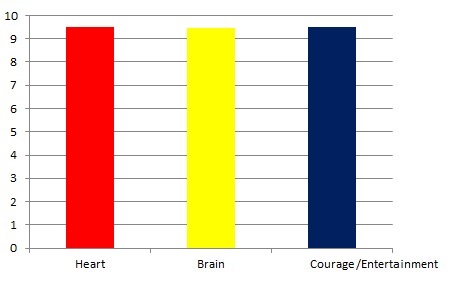
Main Page
Alphabetical Menu
Chronological Menu
|
The Last Black Man in San Francisco  Montgomery (Jonathan Majors), an aspiring playwright, works at a fish market and lives with his grandfather (Danny Glover) and his best friend, Jimmie (Jimmie Fails), in the neighborhood of Hunters Point, San Francisco. Jimmie desperately wishes to reclaim his childhood Victorian home that he claims his grandfather had once built. Jimmie's father (Rob Morgan) lost the home years ago as he struggled with drug addiction. After speaking to the property's real estate broker, Clayton (Finn Wittrock), and learning that the deceased homeowner's next of kin are fighting over it, Jimmie persuades Montgomery to squat in the house with him while renovating it. The Last Black Man in San Francisco is a lyrical, mesmerizing and genuinely heartfelt story about a city that has turned its back on the poor and black members of its population. San Francisco becomes a characters in itself. It's one of the most multi-faceted and compelling characters of the film. The cinematography by Adam Newport-Berra has the visual poetry of a Terrence Malick or Carlos Reygadas film, and even the music by Emile Mosseri speaks louder than words. Although the plot centers on Jimmie's childhood house, the film isn't really about the house itself; it's about larger issues and feelings that are profoundly human. This is the kind of film that transcends its plot in many ways. A film's plot, after all, isn't as important as the emotions that are contained inside of it. A lot happens in The Last Man in San Francisco, but a lot of it transpires off-screen within the imagination of the viewer. Bravo writer/director Joe Talbot and co-writer Rob Richert for trusting the audience's imagination, a very power tool, as well as their emotions and intellect. They wisely avoid flashbacks and unnecessary exposition while deftly balancing the heavy drama with just the right amount of comic relief. Even some of the editing choices and sound editing are unique and brilliant, such as an unexpected transition between the end of the song "Somebody to Love" by Jefferson Airplane and Jimmie hammering a nail in his childhood home. They also avoid preachiness, sugar-coating and cheesiness as they tackle a variety of issues such a gentrification, racism, friendship, history, capitalism and poverty. Those themes are indeed relatable and universal, but the way that the filmmakers incorporate them into the narrative and how they tell the narrative remains boldly unconventional and refreshingly un-Hollywood which makes the experience of watching The Last Black Man in San Francisco all the more transcendent and unique.
The Last Black Man in San Francisco is fundamentally a protest against the status quo. Its social commentary has shades of Spike Lee and Ken Loach. Writer/director Joe Talbot comes across as a filmmaker who's a cynical optimist and, most importantly, a humanist which is evident from the palpable humanism the permeates through every frame of the film from the screenplay to the cinematography, music and the breakthrough performances of Jonathan Majors and Jimmie Fails. He and Richert treat the characters of Jimmie and Montgomery with compassion just like Montgomery treats his blind grandfather compassionately as he takes care of him. Jimmie and Montgomery's friendship feels very real, and the same can be said about the evolution of their friendship with its highs and lows intact. The Disney/Pixar film Inside Out would be endlessly fascinating if it were to show audiences the emotional control center of either Jimmie or Montgomery. Both of them are complex human beings who go through the entire spectrum of human emotions throughout the film---some of those emotions are more dominant than others while some of the recessive emotions, i.e. anger, become dominant later on. A scene on a bus where Jimmie interrupts a conversation between a stranger, Becca (Thora Birch), and her friend represents one of the film's intellectual centers. It feels just as powerful and haunting as the "Love/Hate" scene in Do the Right Thing and the daisy scene in Harold and Maude. If only that bus scene were longer, though, but perhaps the filmmakers wanted to allow audience to debate and to discuss the topic of love and hate among themselves. Life isn't black-and-white, after all, and a range emotions, some even contradictory, exist within every human being. Emotions are like the seasons of fall, winter, summer and spring. It's unnatural and unhealthy to cherish winter while ignoring summer, spring and fall. Hate comes with love and everything in between. With despair comes hope, with anger comes tranquility, and with joy comes sorrow. It's a human right for each of us to be treated as a unique, complex individual. As Maude told Harold using daisies as a metaphor for human beings, "Some are smaller, some are fatter, some grow to the left, some to the right, some even have lost some petals---all kinds of observable differences. You see, Harold, I feel that much of the world’s sorrow comes from people who are this [picks up a daisy], yet they allow themselves to be treated as that [looks at sea of daisies]." Much like other transcendent films such as Harold and Maude, The 400 Blows, I, Daniel Blake and Ghost World, The Last Black Man in San Francisco is, at its core, a poetic cry for humanity.
 Main Page Alphabetical Menu Chronological Menu ______________________________________________________ |
The NYC Movie Guru
themovieguru101@yahoo.com
Privacy Policy